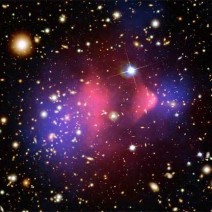A cosmologist has shown that an already existing extension of general relativity may eliminate major problems in gravitational physics, and answer major questions in cosmology.
The Einstein–Cartan–Sciama–Kibble (ECSK) theory of gravity naturally extends general relativity to account for the intrinsic angular momentum (spin) of elementary particles. This theory, named after Albert Einstein, Élie Cartan, Dennis Sciama, and Tom Kibble, causes spacetime to exhibit a geometric property called torsion.
The Big Bang cosmology based on Einstein’s theory of general relativity successfully describes most of the properties of our Universe. However, it does not answer some important questions such as the nature of dark energy and inflation, what caused the observed asymmetry between matter and antimatter, or the origin of the rapid expansion of the Universe. Also, general relativity breaks down inside black holes and at the beginning of the big bang.
The ECSK theory, outside situations of high matter densities such as black holes or in the very early Universe, reduces to general relativity, thus passing its experimental and observational tests. According to Nikodem Poplawski, from Indiana University, ECSK gravity may eliminate the major problems previously mentioned.
First, torsion manifests itself as a force that counters gravitational attraction, avoiding singularities. As a result, the big bang is replaced by a big bounce that resulted from the contraction of another Universe. Also, spacetime torsion naturally explains today’s apparent flatness of the Universe, without requiring cosmic inflation (an extremely short and fast period of expansion).
Another interesting phenomenon is that matter inside a black hole won’t compress into a singularity; it will rebound and expand to produce a closed, new universe inside. Our Universe itself may have originated from the interior of an intermediate-mass black hole!
The ECSK theory of gravity may also explain the nature of dark energy, the observed matter-antimatter imbalance in the Universe and the origin of dark matter. For example, four-fermion interactions can act like a cosmological constant, and torsion can lead to a scenario in which dark matter is actually made of antimatter.
So, could ECSK gravity be the answer to the most important problems in cosmology? Maybe. It is, at least, an elegant proposition that does not involve any modification of existing theories (it is an extension of Einstein’s relativity), and which, like general relativity, does not have any free parameter.


